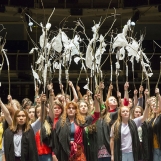Directing and Dramaturgy, 2017
Full Name: Sam Haddow, Cara Berger, Clare Finburgh
Annual Conference Theme (if applicable): Interval
What were the main points that emerged from your WG this year?
2016’s ‘tragedy’ topic proved remarkably productive and extremely focussed; for 2017 we decided to open out the topic in a more nebulous direction, and so the ‘interval’ themed workgroup proved again to be markedly stimulating, though in this instance much more thematically varied. We again had panellists from a range of practices and at varying levels of seniority, with some such as David Barnett, Kate Adams and Harry Wilson reflecting on their own practices across Brechtian theatre, commemorative performance and photography. Freya-Vass Rhee, Bryce Lease and Gareth Vile considerably expanded the topical remit of the workgroup by focussing on Dance, Communist statues and graphic novels respectively, where Joe Kelleher and Carl Lavery played with the formal conventions of academic papers by performing an antagonistic dialogue with one another which was voiced entirely by Joe, in Carl’s absence.
As with the previous year, we were struck by the range of contributions on offer, and the way in which the nature of the workgroup appeals to people working in diverse branches of performance studies, as well as encouraging experimentation (both in terms of pursuing unfamiliar subjects and formal inventiveness in methods of presentation) amongst group members. Finally, we continue to be heartened by the fact that group members are continuing to engage with a range of critical theories which, perhaps because of the workgroup’s commitment to the pragmatics of performance, are tested and explored in unusual and innovative fashions – an example of this being Mark Robson’s paper, which used Elfride Jelineck to challenge Derrida’s notion of iterability.
What was discussed at your business meeting?
Feedback from members on ECR bursaries:
Conference attendance feewaivers for unaffiliated ECRs
Pass on to exec what “unaffiliated” might mean – what about ECRs who have fractional contracts and/or are teaching-only with no access to financial research support
Bursaries
Question for exec: Could the partner organisations be non-UK based?
Feedback from members on workgroup:
Timings: Shorter papers of 15 mins generally seen as positive, could chairs/speakers be asked to keep to these more strictly to allow for all the things that typically “eat in” to timings?
Social: There was no pre-arranged social this year which meant that this part of working group life became a little sidelined. For the 2018 conference a social meeting should be arranged for the first day of the conference (ideally somewhere where people can eat if they want to but don’t have to; i.e. a proper sit-down meal)
CfP: Make clearer what formats presentations can be in from the start; in general having the choice between submitting a written paper or not was welcomed; a thought: it would be good to also include an expression of interest for non-presenting members so we can circulate papers to them too
Types of contributions:
papers and performed lectures
Number of formal contributors (those listed in book of abstracts) 15 presentations of which 6 PhD, 5 professorial,1 international
Approx. overall number of delegates who attended your WG Sessions Panel 1: 18, Panel 2: 19, Panel 3: 22, Open Panel: 24, Panel 4: 15
Composition of WG (PG, ECR, etc.)
The group includes members at all stages of their careers from professors to mid- and early-career academics, PhD students, and practitioners
Did you have any non-UK participants? Yes
If your WG hosted an Open Panel, do you have any feedback?
In our group we need to ensure that we brief participants who will be speaking in the open panel that non-group members will be present, papers won’t have been circulated etc.
Otherwise, the open panel was very well attended and went very well.
Any additional points or feedback not covered above?
Many thanks to the TaPRA excec. and to Konstantinos for making our jobs so enjoyable.

